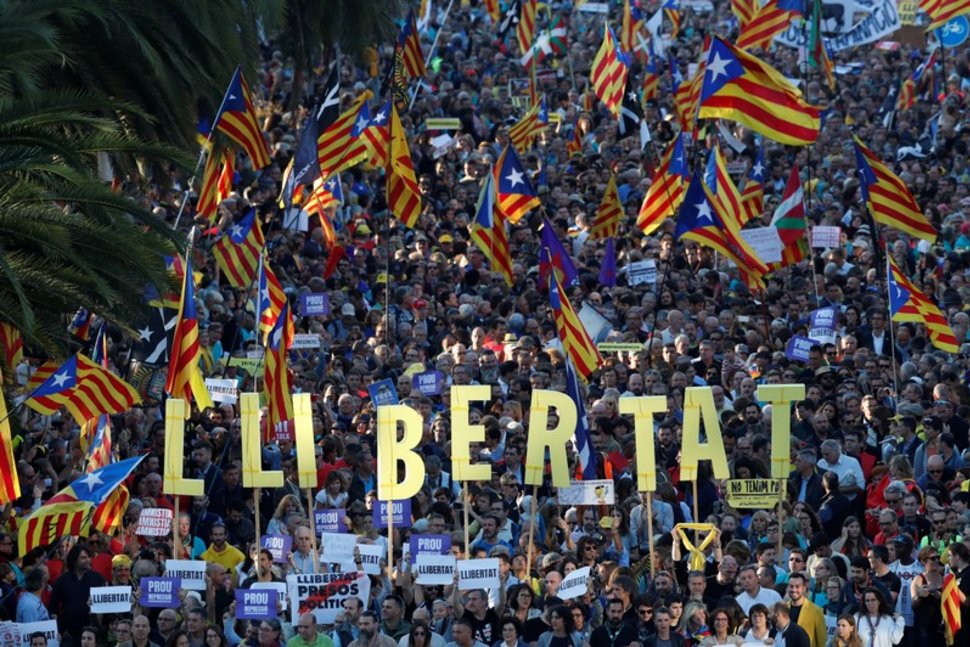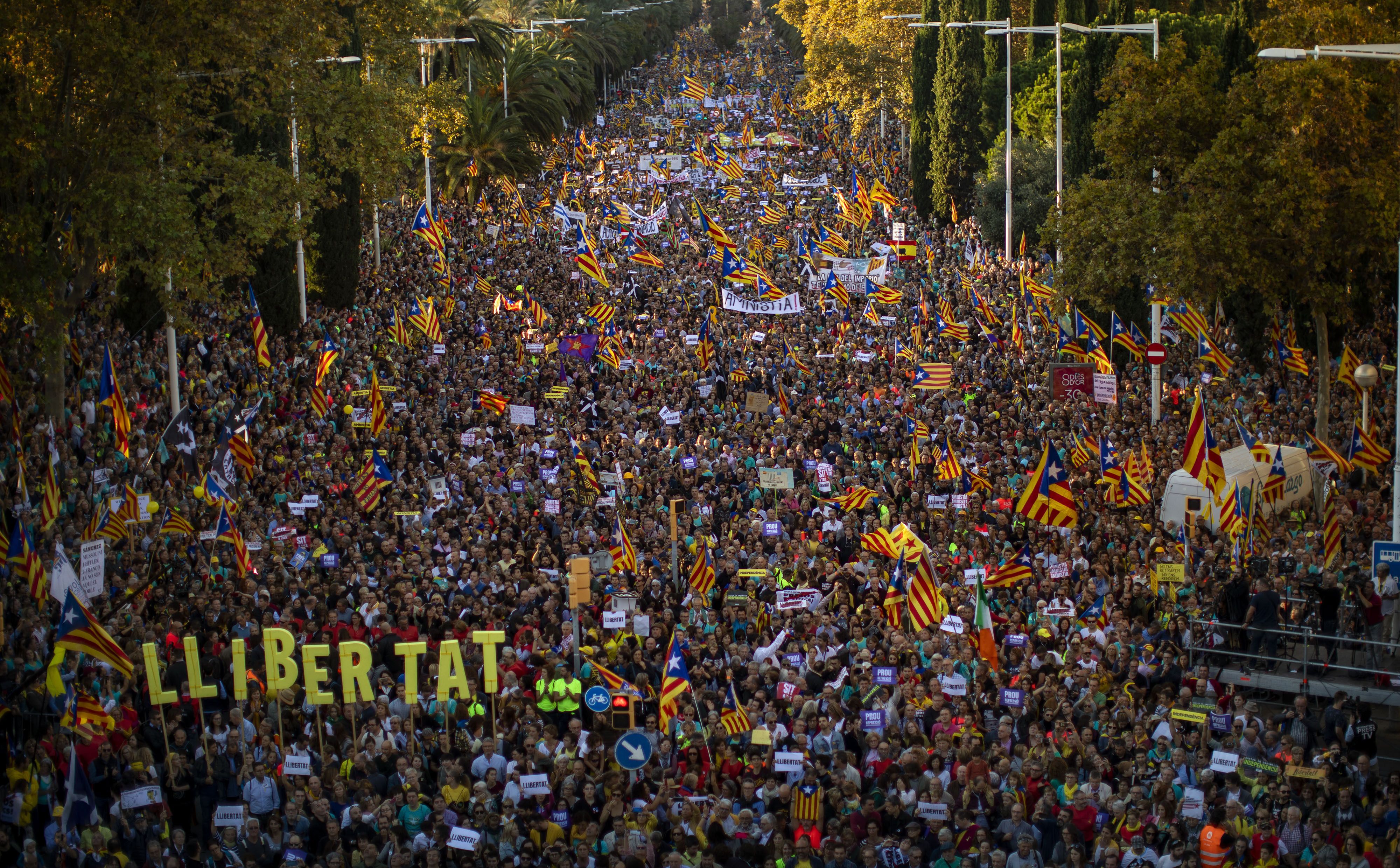www.aljazeerah.info
News, October 2019
Archives
Mission & Name
Conflict Terminology
Editorials
Gaza Holocaust
Gulf War
Isdood
Islam
News
News Photos
Opinion Editorials
US Foreign Policy (Dr. El-Najjar's Articles)
www.aljazeerah.info
Hundreds of Thousands of Catalans March Peacefully Calling for Release of Leaders October 26, 2019 |
 |
 |
|
Catalans in Barcelona protesting and calling for the release of jailed leaders , Spain, October 26, 2019 |
|
***
Huge Crowds Join Grassroots March for Jailed Catalan Leaders
By Joan Faus, Oct. 26, 2019
MADRID (Reuters) -
Hundreds of thousands of Catalans marched peacefully through Barcelona on Saturday in support of calls to free jailed separatist leaders, after the region's mayors demanded it be allowed to map out its own political future.
The city has witnessed daily pro-secession demonstrations since Oct. 14, when Spain's Supreme Court jailed nine politicians and activists for up to 13 years for their role in a failed independence bid in 2017.
Grassroots groups Assemblea Nacional Catalana and Omnium Cultural had hoped Saturday's march would draw the largest crowds of any since the sentences were passed, acting as a counterweight to unrest that marred some demonstrations last week, when one gathering drew an estimated 500,000.
Local police put Saturday's attendance at 350,000.
Both groups eschew violence and their leaders are among the nine serving jail terms.
At the head of the march was regional government head Quim Torra, who earlier told hundreds of Catalan mayors after they endorsed a document demanding self-determination: "We have to be capable of creating a republic of free men and woman ... and overcoming the confrontational dynamic with a constructive one."
'SIT AND TALK'
Saturday's crowd included many carrying Catalan pro-independence flags and banners bearing slogans that included: "Prison is not the solution", "Sit and talk" and "Freedom for political prisoners".
One marcher, 65-year-old Francesc Dot, said the nine leaders had been jailed in defense of "Spain's unity."
His wife, Maria Dolors Rustarazo, 63, said she should also be in prison because she voted in the 2017 referendum, which Spanish courts outlawed. "If (all separatist votes)... have to go to jail, we will go but I don't think we would all fit," she said.
She condemned last week's rioting, which had hurt the pro-independence movement, but had understanding for young protesters being "angry at the lack of democracy".
Maria Llopart, 63, criticized a lack of unity among the two main Catalan separatist political movements. "Everything looks very bad, we are not advancing," she said.
Junts per Catalunya, which controls the regional presidency, has been in favor of maintaining a confrontational stance with Madrid, while its leftist coalition partner Esquerra Republicana de Catalunya favors dialogue.
Torra, who belongs to Junts per Catalunya but is not currently affiliated to any party, called in an interview with Reuters this week for Madrid to open talks with a view to the region holding a second referendum.
Spain's main parties, including the minority Socialist government, have consistently rejected any moves towards secession, a stance they have reiterated in recent days as the country gears up for a national election on Nov. 10.
Addressing a party rally in Tenerife on Saturday, acting Prime Minister Pedro Sanchez called last week's unrest in Barcelona "an attack ...on Catalan society".
The region's electorate is split over the issue of independence, and supporters of continued unity with Spain will hold a rival rally in Barcelona on Sunday that the leaders of the country two main center-right parties, PP and Ciudadanos, are due to attend.
(Additional reporting by Catherine Macdonald; writing by John Stonestreet; Editing by Christina Fincher)
***
Catalonia crisis: Barcelona braces for separatist protest
BBC, October 26, 2019
Separatists in Catalonia, north-eastern Spain, are gathering for a march in Barcelona in protest at the jailing of their leaders nearly two weeks ago.
Previous protests in the regional capital drew hundreds of thousands of supporters, but were marred by rioting which saw more than 600 people injured.
Organisers are calling for a peaceful march which will also underline support for self-determination.
Spanish unionists plan to hold their own mass rally in the city on Sunday.
Nine separatist leaders were jailed on 14 October by Spain's Supreme Court for between nine and 13 years after being convicted of sedition.
The days that followed saw some of the worst violence in the history of the modern independence movement, which prides itself on its peaceful tactics.
What is happening on Saturday?
A day of protest in Barcelona began with a gathering of mayors from across Catalonia to endorse the campaign for self-determination.
Mayors of 814 out of the region's 947 local authorities gathered at the regional government's headquarters to meet Catalan President Quim Torra.
Media playback is unsupported on your device
Catalonia independence protesters: 'We feel like we are all being tried'
Media captionCatalonia independence protesters: "We feel like we are all being tried"
As the mayors chanted "independence", Mr Torra said Catalans must unite to oppose "repression" and "force the Spanish state to talk".
Grassroots independence groups are urging independence supporters to fill the streets but say they are committed to peaceful protests, Reuters news agency reports.
Image copyrightReuters Image caption Demonstrators marched near Barcelona's Sagrada Familia church on Saturday
On Sunday, politicians from Spain's two main centre-right parties, the Popular Party and Ciudadanos, are expected to attend the unionist rally, which comes two weeks before the Spanish general election.
Meanwhile, supporters of the far-right Vox party rallied in the Spanish capital Madrid on Saturday to hear calls for a harder line on the separatists.
Party leader Santiago Abascal attacked Spain's mainstream parties, including the ruling Socialists, telling the crowd: "Faced with criminal separatism, there is only Vox!"
How bad were the clashes earlier this month?
Media playback is unsupported on your device
Bel, student, 20: 'We are living demonstrations'
Media captionBel, student, 20: "We are living demonstrations"
Rioters threw paving stones and petrol bombs while police fired baton rounds and used truncheons.
Cars and other property were damaged as fires were lit in the streets of Barcelona and other towns.
Between 14 and 20 October, 593 people, including 226 police officers, received treatment for injuries as a result of the protests, according to regional emergency services.
The Spanish authorities later updated the number of officers injured to 289.
Why is there a crisis in Catalonia?
Successive Spanish governments have refused to grant separatists in Catalonia a referendum on independence, which became a live issue again after the global financial crisis of 2008.
Media playback is unsupported on your device
Catalan Minister Alfred Bosch: We’re not haters
Media captionCatalan Minister Alfred Bosch: "We’re not haters"
Spurred on by the results of an unrecognised plebiscite in November 2014, separatists held an illegal referendum in October 2017, which Spain tried to prevent by force, eventually jailing the separatist leaders.
While the separatists regularly attract massive shows of public support, they have only a slim majority in the regional parliament and a recent survey suggests Catalonia's residents oppose independence by about 48% to 44%.
Catalonia has its own language and distinctive traditions, and a population nearly as big as Switzerland's (7.5 million). It is one of Spain's wealthiest regions, making up 16% of the national population and accounting for almost 19% of Spanish GDP.
The EU has treated the crisis as an internal matter for Spain, deaf to the separatists' pleas for support, but there have been warnings that the issue is damaging Spain's democratic credentials.
https://www.bbc.com/news/world-europe-50194846
***
Few parallels in Catalonia with events in Hong Kong
By Rafael Dezcallar *
In Spain and Hong Kong there were protests on the streets and clashes with police, but that’s where the similarities end
In the last few days, some people have tried to establish a connection between the events in Hong Kong and what happened recently in Barcelona. This connection may have been accepted by people of good faith who do not know the political situation in Catalonia very well. This is perfectly understandable. Most Spaniards do not know the political situation in Hong Kong very well either.
In both cases, there were protests on the streets and clashes with the police. However, the parallels stop there.
Spain is a democracy governed by the rule of law, where all political ideas can be openly and freely defended. According to Freedom House’s 2019 Freedom in the World Report, Spain scored 94 out of 100 in its commitment to political rights and civil liberties – equal to Germany and Britain.
When the Spanish Constitution was approved by referendum in 1978, 90.5 per cent of Catalan voters supported it, and just 4.6 per cent voted against it. The constitution grants a very high level of autonomy to Catalonia and also enshrines the country’s territorial integrity, as do most democratic constitutions.
Nonetheless, in 2017 some politicians tried to force the unilateral secession of Catalonia from the rest of Spain. What was peculiar about this effort is that it was not conducted by any opposition or underground group, but by the president and some counsellors of the Catalan autonomous government, and by the president of the Parliament of Catalonia. That is, from the very institutions created by the Spanish Constitution to grant an extensive degree of self-rule to all Catalans.
To achieve their goals, the politicians breached the Spanish Constitution, the Catalan Statute of Autonomy and many other laws. They ignored decisions of the Courts of Justice, including the Constitutional Court. In short, they acted in complete disregard of legal and democratic procedures, promoting public disorder and financing some of those activities with public funds. All those actions were directed from the top positions of the government and the Parliament of Catalonia.
Those politicians represented a minority of the population of Catalonia, because only a minority – though a large one – of Catalans support secession. That minority is steadily in decline. Paradoxically, it holds the majority of seats in the Catalan parliament due to the proportional system of distribution of the votes. Their support outside Catalonia is negligible, while any change of the Spanish Constitution would have to be approved by the Spanish people. The pro-independence parties are simply not strong enough to break up an old European nation like Spain. They nonetheless tried to impose their views on the rest of the population, claiming that only they represent the people of Catalonia.
The leaders of this movement were put to trial. The judicial proceedings were carried out with every possible safeguard and with the utmost transparency. The trial was broadcast online. The Supreme Court established that their actions had breached the Spanish Constitution, the Catalan Statute of Autonomy and other Spanish laws, and sentenced them to prison terms.
Those politicians have not been convicted for their ideas. Today, both the president of Catalonia’s autonomous government and the president of its parliament are pro-independence leaders. In Spain, defending political ideas like changing the constitution or declaring the independence of a portion of the national territory is not in itself a criminal offence. What is a crime is to pursue those goals in open violation of the law. This is what they were convicted for.
Some people in Catalonia agreed with the court’s decision, while others disagreed. The vast majority of the latter have expressed their disagreement peacefully, but some have resorted to violence and riots in the streets.
The Spanish democracy is strong, and it will overcome this situation. After the ruling, a new phase is at hand for the reconciliation. Our constitution provides the democratic framework for a deep political dialogue among Catalans, those who are pro-independence and those who are against. And also for the continuous prosperity and stability of Catalonia, one of the most vibrant, diverse and attractive parts of Spain.
* Rafael Dezcallar is Spain’s ambassador to China.
https://www.scmp.com/comment/opinion/article/3034702/few-parallels-catalonia-events-hong-kong
***
Share the link of this article with your facebook friends
|
|
|
|
||
|
||||||


